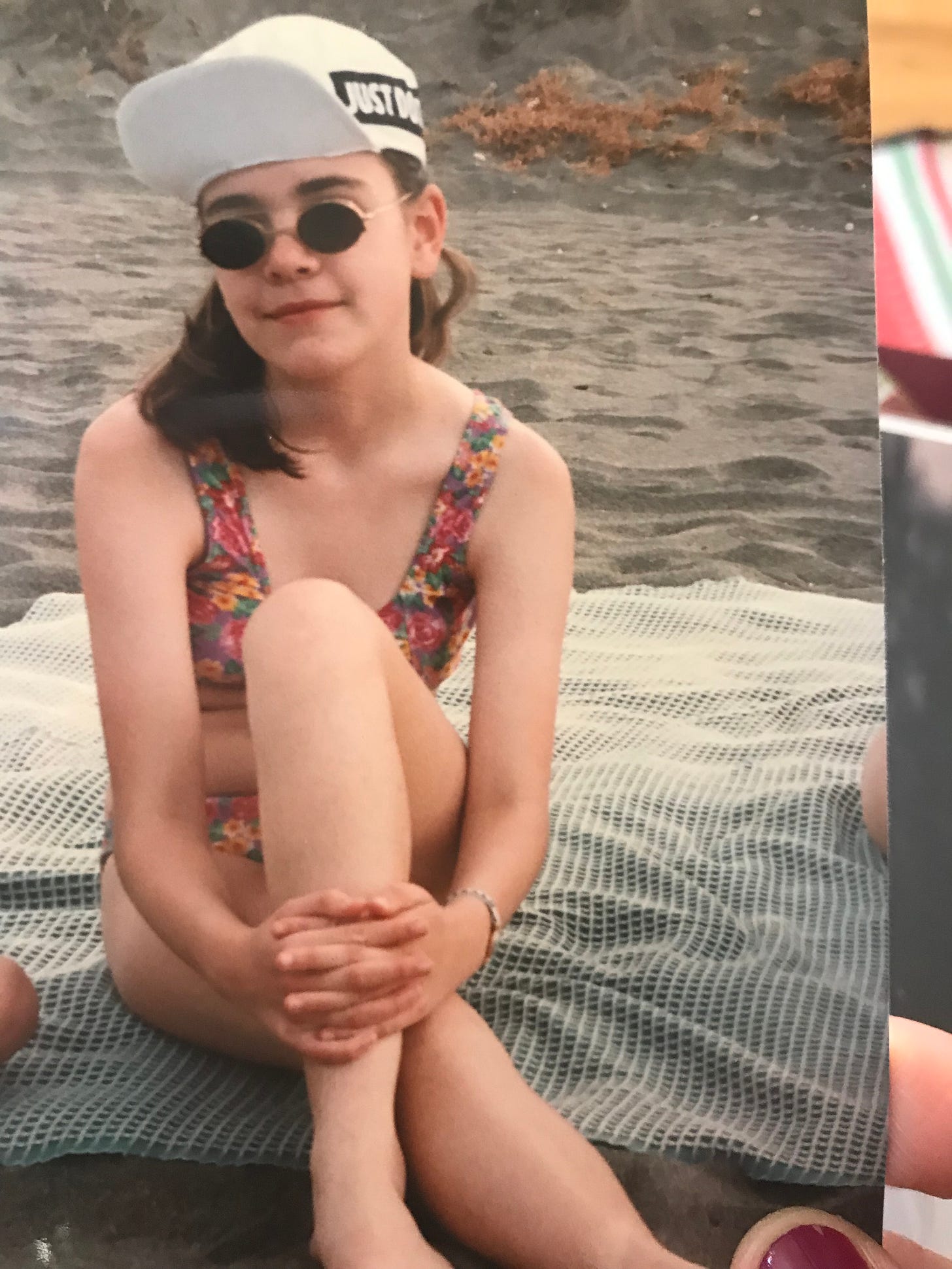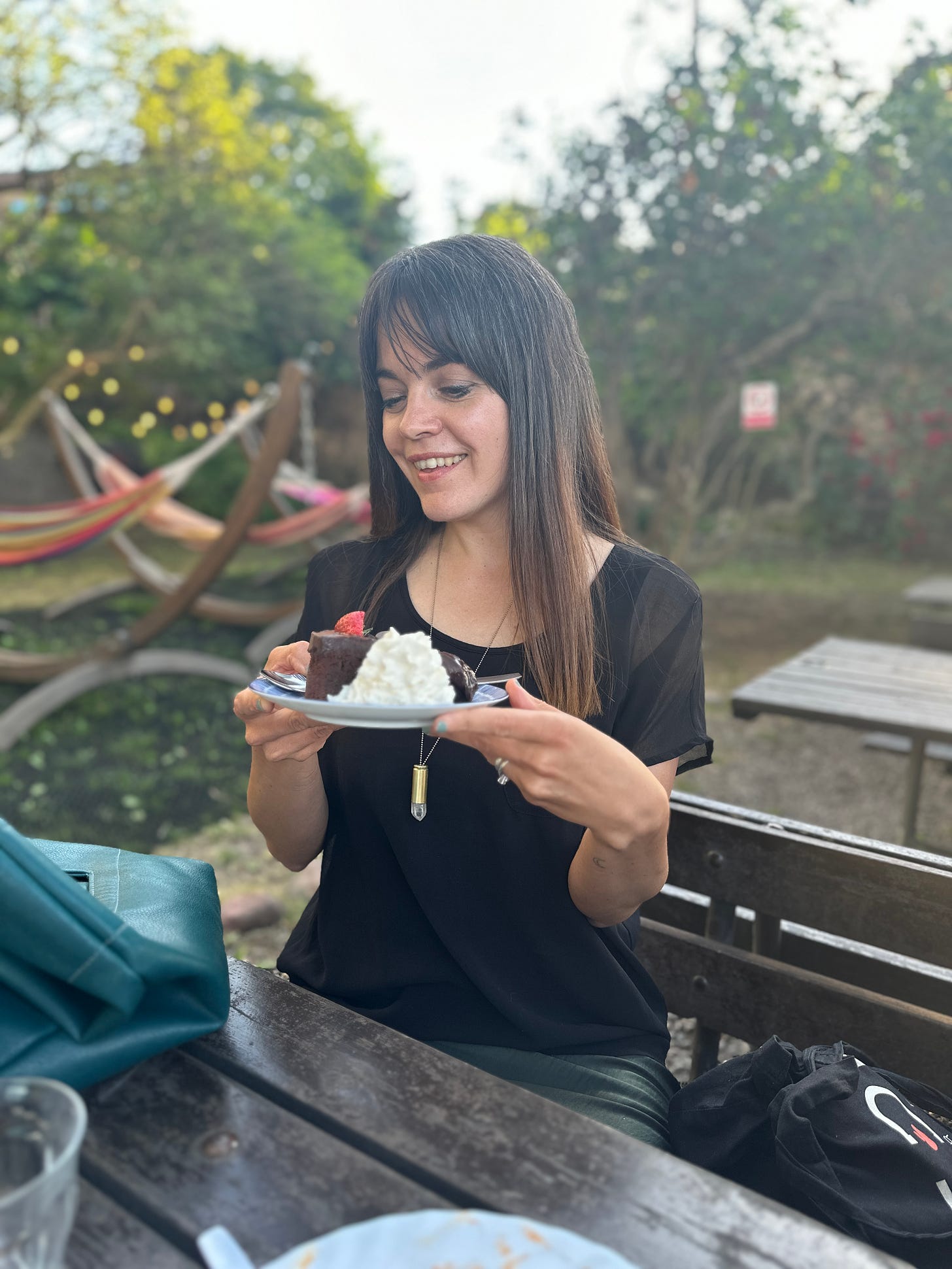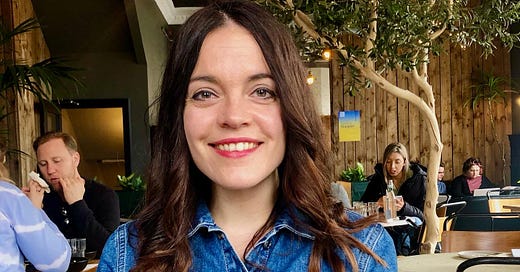TRIGGER WARNING: This text contains references to behaviours linked to eating disorders
My relationship with food started off positively. Growing up, food was celebrated in my home - I come from a family accustomed to elaborate, lavish Russian festive dinners, shared joyfully among loved ones in a relaxed, affectionate atmosphere full of laughter that I still carry with me as an adult. Warming soups, hearty stews, indulgent desserts - a variety of flavours was present and welcome on my family’s table.
But then, as I got a little bit older, I noticed something. The women around me seemed to be more careful with what they ate (not the men. Never the men). Powdered shakes started showing up instead of lunch. Diet books were thrown around. My best friend was a naturally super-slim ballet dancer, and I wanted to look exactly like her - but an adult said I was “too fat” to be a ballerina. At eight years old, I looked at my Barbie doll and thought, “I want to be as thin as this doll.” That night I did so many push-ups that I threw up. Later, when people around me tried a fasting diet, I followed suit. At twelve years old, I did something I could never fathom doing today (unless struck with a severe stomach bug): refrain from eating for twenty-four hours. I still remember the first meal that followed a day of fasting. I was almost scared of how ravenous I was. I also started reading women’s magazines, which were full of weight-loss exercise regimes and styling tips for looking thinner. I learned my first lesson around food: it was something we loved, but it was also something we feared.

As my family were Russian immigrants in Sweden, we moved around a lot, and as a result I was constantly the “new kid” at school, which led to constant bullying. Dissecting my classmates’ snide comments, I concluded that I probably deserved the treatment I got. After all, I was weird. I did wear glasses and hand-me-down clothes. I was indeed bad at sports. So the bullies weren’t saying anything untrue, really. Around this time, I began having anxiety attacks – an even more terrifying experience if you don’t know what anxiety attacks are and are thus completely clueless as to what is happening to you. In an bid to control my emotions the only way I knew, I alternated attempts at rigid dieting with periods of extreme bingeing – slowly venturing into the territory of making myself throw up. I remember feeling so low right before the binge, and afterwards feeling like I’d hit rock bottom - and the only way to go was up. The following day, I’d feel fresh and pure, as I vowed to never do that again. Until the cycle repeated. I learned my second lesson about food: I could use it to make myself feel worse, and sometimes I had to feel worse before I felt better.
At 19, I moved to Los Angeles to study theatre and go on auditions as an actor. When I confided in a classmate that I sometimes threw up after meals, her reaction was, “so? Who doesn’t?”. I came to have a normalised view of my own disorder with the explanation that everyone else was doing it too.
When I returned to Stockholm, I finally got treatment. With the help of doctors and an amazing therapist, I started to learn how to think differently about food and my feelings. I found the underlying reason for my illness: my perfectionism had driven me to depression. I had to re-teach myself how to perceive my own emotions in order to feel better.
I had been a pescatarian since the age of 11, but I never connected my refusal of meat to anything other than ethics. I didn’t view meat as unhealthy or as having any kind of negative effects on my body. I didn’t want to eat animals and that was that – but once I learned more about fish and their ability to feel pain, as well as what truly goes on in the dairy and egg industries, I felt inspired to make the slow, gradual transition to veganism.
As I educated myself more and more on my new lifestyle, my whole view of food changed. Every meal I ate felt meaningful and inspired, like I was taking a stand against animal abuse every time I ate something (which is what actually happens when you choose vegan meals). I experimented with new ingredients – to think that I had rarely considered beans or lentils before going vegan. And desserts! For some reason, I believed that vegan desserts only were a thing in the US – before moving to London, I was under the impression that if you wanted a vegan cake, you would have to bake it yourself. When I bumped into a Ruby’s Of London vegan cupcake stall on my third day in the UK, I was overcome with joy!
I understand that these things differ for different people, but for me, the health benefits of veganism have been vast and long-lasting: that sluggish tiredness that I have carried with me for so long dissipated and I now have much more energy. My skin looked fresher and less dull. And my stomach is another success story. In my pre-vegan days, I suffered from bloating, horrible stomach burns and aches. I could wake up in the middle of the night feeling like someone had stabbed me in the stomach. As soon as I cut out eggs and dairy, my tummy found its natural health and the pain lifted.
I’ve had questions about how this kind of “controlled” eating squares with having an eating disorder. I explain that now I eat to live, to nurture myself and to enjoy my food. No food I eat is “bad” or “naughty” – all vegan foods are good for the animals we are saving when we choose them. Once in a former job, a non-vegan colleague asked if I wouldn’t like to have one day a year when I “ate whatever I wanted.” I explained that I already eat whatever I want, every day. When you stop seeing animal products as food, you no longer want them. I had learned my third food lesson: it can be a tool for a better world.
And speaking of what I want, going vegan has also helped me learn to listen more to my body, and helped me realise that often I don’t really want the food I end up eating because of societal pressure. Before my vegan transition, I would keep drinking on a night out despite the creeping onset of heartburn, because IT’S FRIDAY NIGHT! and unless you keep topping up, you will get questioned about why you are not drinking (pro tip: sip sloooowly. That way you will always “still” have a drink in your hand without having to actually drink more alcohol). I’d also have brownies for breakfast just so I could post on Instagram about how indulgent and luxurious I was being – when in reality those brownies were making me feel sluggish and causing my dentist bills to soar. There is a strong standard in our society that ties food to social life and even identity. If you don’t eat or drink this or that, you are viewed as boring, sanctimonious and holier-than-thou, even if the truth is that your body simply doesn’t take well to it. Mindful eating to me means listening to yourself and learning more about what works.
I talked to vegan registered dietitian Taylor Wolfram, who works with an anti-diet mentality and promotes body liberation. She recognised my sentiment from some of her clients. “Some of my clients and vegans who have shared their eating disorder recovery stories with me have experienced veganism as a powerful positive force in their healing journey. It helped them no longer see food as a way to restrict or harm themselves but as a means to living out their values and helping animals.”

That is exactly how I feel. Choosing a vegan lifestyle has aided me in un-coupling food from body image and opened up a newer, deeper meaning to eating: choosing meals free from cruelty helps me view my food choices as the social justice issues they are rather than a mere tool to make my body conform to a certain type of look that society imposes on all of us. And I am not the only one: in her VICE piece “I Stopped Bingeing and Purging When I Became A Vegan“, Melissa Meinzer confirms exactly what I felt: “I didn’t go vegan to lose weight or control what I ate. For me, veganism turned out to be more important than my bulimia. I was taking a stand and eating my politics in a way that felt unassailably correct. It was an adventure, and it came with a profound and unexpected benefit: It gave me relief from my bingeing and purging.” It’s for these reasons that many survivors of eating disorders are finding that veganism makes your meals go from “diet” to “ethical choice”, which takes away a large part of the power that the dieting industry holds over us.
I’m not claiming that my lifestyle change is the solution to eating disorders, and I do need to stress that I had already received treatment before going vegan. Taylor Wolfram reminds: “Now, just because that is the experience of some people doesn't mean that is the experience for everyone in recovery. All recovery stories are unique, including for vegans.” Her advice for vegans who want to break free from diet culture’s grip is to introduce new foods. “My best and most simple advice here is to focus on substitution rather than elimination. So rather than think about removing all animal-derived foods from your diet, think about substituting them with vegan foods that are more or less equivalent on both a nutrition level and a satisfaction level. Meaning you're not just focused on covering the nutrients but the joy and pleasure and yumminess as well! This can be tricky for some people, which is where the help of a registered dietitian comes in.”
For some people, switching to a plant-based diet can be a way of masking their problems with disordered eating. I think this is rooted in not seeing veganism for what it is - an ethical standpoint, rather than a health-based eating regime. My own personal belief is also that going vegan when you have a history of eating disorders needs to mean one thing only: going vegan. Not raw vegan, “whole food plant based”, “raw til 4”, low carb, low fat, SOS-free or any of that stuff. You’re cutting out animal-based foods only, on the basis that they are animal-based. Nothing else. All other foods are welcome.
With this in mind, it’s important to remember that it’s reductive and incorrect to lump in veganism with diets that mostly aim to alter women’s bodies and make money off it. Veganism is not about raw-food cleanses. Veganism is a social justice movement - it has nothing to do with health outcomes or losing weight. Fat vegans exist and are welcome in the movement. I know that mentally separating food from health in this way is not easy, but veganism goes beyond ourselves. Opening your eyes to the ethical philosophy of veganism can help some (not all) eating disorder patients see food differently, and hence be a useful tool to aid in recovery. Like it was for me.
See more resources for a healthy approach to living vegan on Taylor Wolfram’s website.





This is such a great post and I couldn’t be happier that I stumbled across it. As a vegan, in recovery from an eating disorder who’s original route to veganism many many years ago was ethics, I have often felt like I am in battle with professionals around me. Despite the fact, they saw the ethics play out in other ways in my life, many saw the vegan side as my disorder. I’m glad to now be in recovery having maintained my ethics and beliefs (of course without putting myself in a medically unstable position). After all, to save all the animals I had to save myself first.
Thank you for sharing this, and I’m so sorry you were bullied and had such a rough ride. I completely resonate with your food journey though, likewise when I went vegan my relationship with food completely changed because, as you point out, our food choices are no longer primarily about us but are so much bigger than us. I know it isn’t a quick fix for everyone, but this is why I think the ethical impact of food is sorely missing from a lot of narratives around food, and more specifically diet culture. Thanks for your vulnerability in writing about this topic!